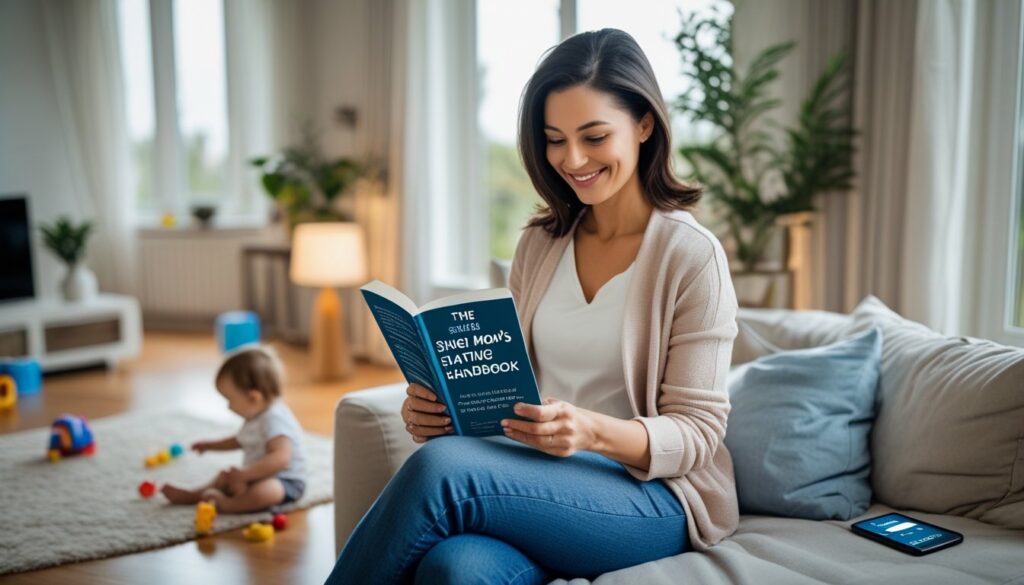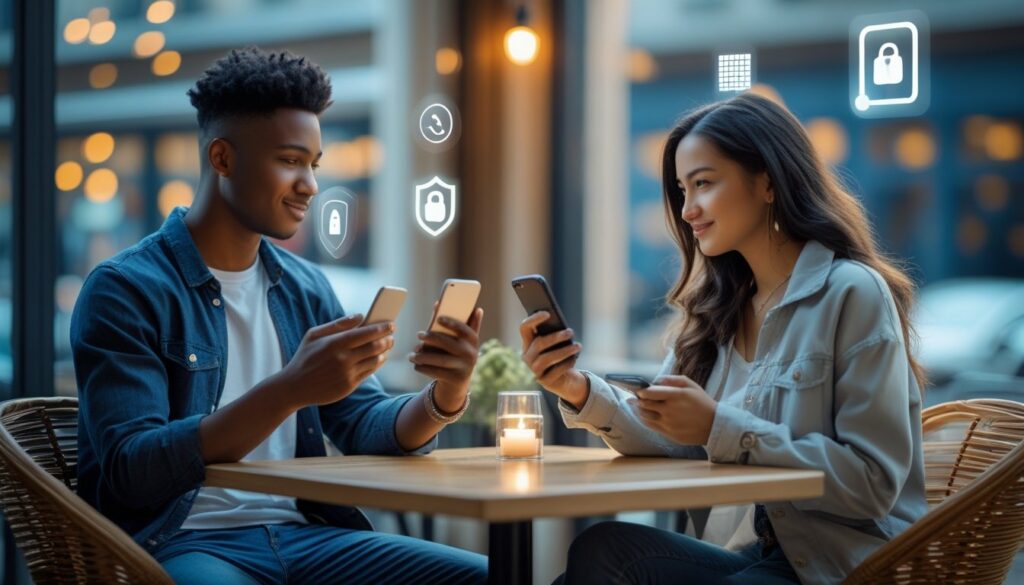Distance doesn’t have to mean disconnection. Whether you’re in a long-distance relationship, separated by work, or dealing with physical barriers, you can stay emotionally close with the right approach.

You need intentional effort, creative communication, and an understanding of what causes feelings of distance to build strong emotional bonds across miles. Many couples and friends keep deep connections even when they’re apart for months or years.
This guide will help you recognize when emotional distance is growing. You’ll learn why it happens and get practical tools to stay connected.
You’ll discover ways to nurture intimacy and overcome the challenges of loving someone from afar.
Key Takeaways
- Poor communication and lack of shared experiences often cause emotional distance.
- Regular video calls, shared activities, and thoughtful gestures help maintain strong connections.
- Patience, creativity, and commitment from both people help overcome distance challenges.
Understanding Emotional Connection at a Distance

To build emotional connection when you’re apart, you need to know what creates these bonds and why they matter. Emotional intimacy develops differently across physical space, and certain foundations support lasting connections.
What Is Emotional Connection at a Distance
Emotional connection at a distance means you feel close to someone even when you can’t be together physically. You might feel that warmth when your partner texts you during lunch or when your best friend calls just to check in.
This bond goes beyond just talking. You share your thoughts, fears, and dreams. You feel understood and supported, even through a screen or phone call.
Distance doesn’t weaken real emotional intimacy if you make it a priority. Couples and friends can stay close across miles and time zones.
You might hear your partner’s love in a voice message or sense your friend’s worry in their texts. These moments show that emotional connection can cross any distance when both people nurture it.
Why Emotional Bonds Matter in Remote Relationships
Strong emotional bonds act like invisible threads that keep relationships alive when distance tries to pull you apart. Without these connections, relationships become surface-level check-ins and small talk.
Emotional intimacy gives your relationship meaning and depth. It helps you feel secure when you can’t see each other every day.
You know your partner or friend cares about your inner world, not just your daily activities. These bonds also help you through tough times.
When you feel emotionally connected, you can work through conflicts, share problems, celebrate wins, and trust each other even during long stretches apart.
Foundations of Emotional Intimacy
Emotional intimacy grows from trust, vulnerability, and consistent communication. You need all three to create lasting connections across distance.
You build trust by keeping promises and showing up emotionally. If you say you’ll call, you call. If your partner shares something personal, you keep it private.
Vulnerability means opening up about real feelings, not just easy topics. You share when you’re scared, excited, or confused.
Consistent communication means having regular, meaningful conversations where you both feel heard. Maybe you video call every week or send voice messages during your morning coffee.
These foundations work together like a three-legged stool. If one is missing, your emotional bond becomes shaky. Keep all three strong, and your relationship can handle distance.
Recognizing Signs of Emotional Distance

Specific warning signs usually appear before major problems develop. By understanding these early indicators, you can address emotional detachment before it damages your relationship.
Common Indicators of Growing Apart
Communication changes often signal trouble. Your partner may give shorter answers or stop sharing details about their day.
If you keep having shallow conversations, emotional distance may be growing.
Physical affection decreases when emotional connection weakens. Your partner might pull away during hugs or avoid holding hands.
You may notice less interest in intimacy, or your partner might sit farther away during movies.
Shared activities disappear from your routine. You used to cook dinner together or watch shows, but now you eat separately or scroll your phones.
Your partner may stop asking for your opinion and handle things alone.
How Emotional Disconnection Affects Partners
Loneliness becomes common even when you’re in the same room. You might feel more alone with your partner than by yourself.
Arguments may change. Some couples fight more about small things, while others stop arguing and give up trying to connect.
You start questioning the relationship’s future. You might wonder if you’re still compatible or if they still love you.
Daily routines shift to avoid interaction. One person might stay up later or wake up earlier, creating separate schedules.
Trust and emotional safety decrease. You may hesitate to share your feelings because your partner seems distant.
Recognizing Early Warning Signals
Pay attention to your gut feelings. That sense that something is “off” often means something is wrong.
Notice response delays in conversations. Your partner may take longer to answer or need you to repeat things.
Watch for emotional numbing. Your partner might seem less excited about good news or less upset about problems.
Check if they avoid eye contact during conversations. Looking at phones or the TV instead of you shows disconnection.
Monitor social media behavior. If they are more active online but less engaged with you, emotional distance could be growing.
Look for changes in future planning. If your partner stops making plans with you or talks less about shared goals, they may be pulling away.
Root Causes of Emotional Distance

Several key factors can create emotional distance between partners. Poor communication, unresolved conflicts, stress, and trust issues often push couples apart.
Communication Difficulties
Poor communication causes most relationship problems. When you and your partner can’t express your feelings clearly, misunderstandings pile up.
Common communication problems include:
- Interrupting each other
- Using harsh language
- Avoiding difficult topics
- Making assumptions
Many couples fall into negative patterns without noticing. You might shut down when your partner raises concerns or get defensive and start blaming each other.
Technology can also make communication harder. Texting important conversations often leads to confusion because tone and emotion get lost.
When communication breaks down, you feel unheard and misunderstood. Both people may stop trying to connect.
Unresolved Conflicts and Emotional Baggage
Unresolved conflicts build up over time and create walls between you and your partner. Small disagreements become bigger problems when you avoid dealing with them.
Emotional baggage from the past can also cause problems:
- Previous relationship trauma
- Childhood experiences with conflict
- Fear of confrontation
- Old hurts that never healed
These unresolved conflicts affect how you see each other. You might start keeping score, and trust begins to break down.
Impact of Stress and External Factors
Life stress puts pressure on relationships. Work problems, money worries, and family issues can drain your emotional energy.
When you’re stressed, you have less patience for your partner. Small things can become major irritations.
Major stress factors include:
- Job loss or work pressure
- Financial difficulties
- Health problems
- Caring for aging parents
- Major life changes
Stress makes it harder to give your partner attention. You might feel too tired for meaningful conversations, and physical intimacy often decreases.
Trust Issues and Infidelity
Trust issues create deep emotional distance. Infidelity can shatter your relationship’s foundation.
Even small betrayals damage trust over time. Breaking promises, lying, or hiding information all contribute to trust problems.
Trust issues show up as:
- Checking your partner’s phone or social media
- Feeling suspicious about their activities
- Difficulty believing what they say
- Emotional or physical withdrawal
After infidelity, rebuilding trust takes consistent effort. Many couples struggle to reconnect emotionally after betrayal. The hurt person may put up walls to protect themselves.
Strategies for Maintaining Emotional Connection

You need regular care and attention to keep strong emotional bonds, especially when distance creates challenges. Honest dialogue, shared experiences, consistent support, and knowing when to seek help make the biggest difference.
Prioritizing Open Communication
Open communication forms the foundation of strong emotional connection. You need to share your thoughts and feelings honestly with your partner, family, or friends.
Start meaningful conversations by asking specific questions about their day. Instead of “How was work?” try “What was the most interesting thing that happened at work today?”
Schedule regular check-ins to discuss both positive and challenging topics. Set aside time each week to talk about your feelings, goals, memories, and future plans.
Listen actively when others speak to you. Put away your phone and give them your full attention. Ask follow-up questions to show you care.
Share your struggles as well as your successes. Being vulnerable helps others feel comfortable opening up to you.
Investing in Quality Time
You don’t need to be in the same location to spend quality time together. You can create shared experiences through technology and planning.
Plan virtual activities together. Watch movies while video chatting, play online games, or take virtual tours of museums. Cook the same recipe while on a video call.
Create rituals you both look forward to, like Sunday morning coffee chats or evening walks while talking on the phone.
Read the same book and discuss chapters, or send daily photos of your activities.
Focus on each other during your scheduled time. Turn off notifications and avoid multitasking.
Send thoughtful messages throughout the day. Share photos, voice notes, or short videos to show you’re thinking of them.
Fostering Emotional Support
Emotional support means showing up for someone during both good times and tough moments. You can comfort and encourage others even from far away.
Celebrate their achievements with enthusiasm. When they share good news, show genuine excitement and ask about their success.
Offer comfort during hard times by listening and acknowledging their feelings. You don’t have to fix everything.
Practice empathy by trying to understand their perspective. Say things like:
- “That sounds really challenging.”
- “I can see why you’d feel that way.”
- “You’re handling this really well.”
Remember important dates and events in their life. Set reminders for birthdays, work presentations, or doctor appointments so you can check in.
Stay consistent with your support. Follow through on your promises and show up when you say you will.
Seeking Professional Help When Needed
Sometimes you need extra support to keep emotional connections healthy. Therapy and counseling can give you helpful tools and strategies.
Try individual therapy if you’re struggling with your own emotional needs. A therapist can help you build better communication skills and work through challenges.
Couples therapy works well even through video calls. Many licensed therapists offer online sessions for people in different locations.
Family counseling can help when several family members feel stressed by distance. Group sessions teach new ways to stay connected.
Look for therapists who understand long-distance relationships or family separation. They know the unique challenges you face.
Creative Ways to Stay Emotionally Connected Remotely

Building emotional bonds from afar takes intentional effort and creativity. You can strengthen your connection through shared activities, smart use of technology, and fun virtual experiences together.
Creating Shared Experiences
Shared experiences help you feel closer even when you’re far apart. You can do the same activity at the same time.
Try watching movies together online using platforms like Netflix Party or Disney+ GroupWatch. You’ll see the same scenes and chat about them in real time.
Read the same book and discuss it over video calls. Pick a book, read a chapter each week, and share your thoughts.
Cook the same meal together while on a video call. Shop for ingredients ahead of time and follow the same recipe.
Start a photo challenge by taking pictures of specific themes each day. Share sunset photos, coffee cups, or funny signs you find. This gives you daily touchpoints and insights into each other’s world.
Play online games together like Words with Friends, Among Us, or Minecraft. Gaming creates fun memories and gives you something to look forward to.
Leveraging Technology to Stay Connected
Technology gives you many ways to bridge the distance gap. Video calls help you connect emotionally because you can see each other’s facial expressions and body language.
Schedule regular video calls at consistent times. Daily check-ins are often more effective than long weekly calls.
Use voice messages instead of only texting. Hearing someone’s voice shares emotion better than written words.
Share your location with each other using apps like Find My Friends. Knowing where your loved one is can create a sense of closeness and security.
Send digital care packages through services like Amazon or local delivery apps. Surprise them with snacks or thoughtful gifts.
Create shared photo albums using Google Photos or iCloud. Both of you can add pictures and see updates in real time.
Virtual Date Ideas and Online Activities
Virtual dates can be meaningful with a bit of creativity. You just need to try new approaches.
Have a virtual dinner date by ordering food from similar restaurants. Set up candles and dress up to make it feel special.
Take virtual museum tours together through websites like Google Arts & Culture. Explore famous museums worldwide and discuss the artwork.
Play online trivia games or do escape rooms together. Websites like Kahoot and Breakout Games offer fun challenges you can tackle as a team.
Learn something new together through online classes. Platforms like Skillshare or YouTube have courses in painting, languages, and more.
Have a virtual karaoke night using apps like Smule or Karaoke Mugen. Laugh together and create silly memories.
Plan future trips together using Google Earth or travel websites. Research destinations and make itineraries for when you can meet in person.
Nurturing Intimacy from Afar

Building intimacy without being together in person takes creativity and effort. You can create meaningful connections through virtual affection, emotional bonding activities, and thoughtful surprises.
Expressing Physical Affection Virtually
Physical touch might seem impossible from far away, but you can still connect meaningfully. Video calls let you blow kisses, hold hands up to the screen, or “hug” by wrapping your arms around yourself while your partner does the same.
Try synchronized activities that mimic physical closeness. Drink your morning coffee together over video or take virtual walks while talking on the phone.
Creative virtual touch ideas:
- Send a pillow or stuffed animal with your scent
- Use couple apps that let you “touch” each other’s phones
- Watch movies together while video chatting
- Do yoga or stretching exercises together online
Make these interactions feel natural and comfortable for both of you. Don’t force activities that feel awkward.
Building Emotional Intimacy Without Physical Touch
Emotional intimacy grows through deep conversations and shared experiences. Ask your partner meaningful questions about their day, dreams, and feelings.
Share your own vulnerable moments too. Talk about your fears, hopes, and childhood memories. This emotional openness can create strong bonds.
Questions to deepen emotional connection:
- What made you feel most alive this week?
- What’s something you’ve never told anyone?
- How do you want to grow as a person?
- What are you most grateful for right now?
Schedule regular “relationship check-ins” to talk about your feelings and needs. These conversations help you stay connected emotionally.
Surprising Gestures and Thoughtful Gifts
Unexpected gestures show you’re thinking about your partner even when apart. Order their favorite food for delivery on a tough day. Send a handwritten letter in the mail as a surprise.
Small, personal gifts are often more meaningful than expensive ones. Create a playlist of songs that remind you of them or a photo book of your memories together.
Surprise ideas for long-distance relationships:
- Schedule flower deliveries for random days
- Mail care packages with their favorite snacks
- Create custom photo calendars or mugs
The timing matters as much as the gesture. Notice when your partner needs extra support or celebration.
Overcoming Relationship Challenges at a Distance

Distance creates unique problems that couples need to solve together. You might feel alone, work through ongoing issues without being face-to-face, or rebuild trust when things go wrong.
Dealing with Loneliness and Isolation
Loneliness can hit hard when your partner isn’t nearby. You might feel cut off from their daily life or struggle with empty evenings.
Create daily connection points to fight these feelings. Set up morning coffee dates over video call. Send voice messages throughout your day. Share photos of what you’re doing.
Make your partner feel present even when they’re not. Try watching movies together online, playing mobile games, or reading the same book and discussing chapters.
Talk openly about loneliness with your partner. They probably feel the same way.
Build a support network where you live. Friends and family can help fill social gaps. Join clubs or activities that interest you.
Addressing Ongoing Relationship Issues
Problems can grow bigger if you don’t address them quickly. Schedule regular check-ins to discuss concerns before they become major fights.
Pick a time when you’re both calm and focused. Avoid trying to solve everything through text messages.
When disagreements happen, state the problem clearly without blaming. Listen to their perspective completely. Find solutions together that work for both of you. Set a follow-up time to see how things are going.
Some challenges are harder to fix from far away. Issues like different life goals or major trust problems need serious conversations. Don’t avoid difficult topics.
Consider couples counseling online. Many therapists offer video sessions for partners in different locations.
Rebuilding Trust After Setbacks
Trust problems often feel worse when you’re apart. You can’t read body language or get immediate reassurance when doubts come up.
Be completely honest about what went wrong. If you hide details or lie, you will make things worse later.
Your partner needs to know the full truth to move forward.
Create new boundaries that both of you agree on. You might decide to share your daily schedule or check in at certain times.
You can also agree to be open about who you spend time with. Some couples choose to give access to social media accounts.
Show consistent actions over time. You rebuild trust through small, reliable behaviors.
Keep your promises. Communicate openly every day.
Don’t expect trust to return overnight. Your partner needs time to feel secure again.
Be patient with their questions and concerns.
Set specific goals for rebuilding trust together. For example, you might have honest conversations every day for 30 days.
You could also share your location when you go out. Clear steps help both of you see progress.




